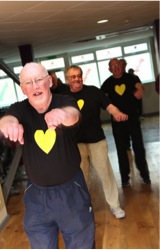By @exerciseworks
 Cardiovascular disease (CVD) is the world’s number one killer. It’s already responsible for 17.3 million deaths per year, and by 2030, expected to rise to 23 million deaths. This year, World Heart Day’s theme on September 29th, 2014 is creating heart-healthy environments. Join us in creating a healthier future for all. Help influence the design of physical activity opportunities that are fun, engaging and most importantly offer better health options for all our patients!
Cardiovascular disease (CVD) is the world’s number one killer. It’s already responsible for 17.3 million deaths per year, and by 2030, expected to rise to 23 million deaths. This year, World Heart Day’s theme on September 29th, 2014 is creating heart-healthy environments. Join us in creating a healthier future for all. Help influence the design of physical activity opportunities that are fun, engaging and most importantly offer better health options for all our patients!
Physical inactivity is the world’s 4th biggest cause of death. Sedentary living has become the norm. We’ve created environments where we are expected to sit and stare. The places in which we live, work and play should not increase our risk of heart disease and stroke. Active transport, active environments, and active spaces can make our lives healthier and more playful (Gates, 2014). We need to actively design heart healthy environments and change those places which encourage sedentary lifestyles. Physical activity and heart healthy exercise is an important part of our daily life. The environments where we live, work, and play hugely effect our ability to make the right choices for our heart health, especially in increasingly urban environments.
So how can health professionals achieve everyone active, every day, within heart healthy environments?
Here are my views:
- All health professionals have a unique role to promote physical activity and protect the public from sedentary behaviours and the risks of non-communicable diseases (NCDs). They need to promote physical activity within the consult environment. They need to shift the paradigm of a medicalised approach to one that proactively, and engagingly, increases exercise as a medicine in patient care. Patients deserve a choice- and that choice should include a variety of options for exercise prescription.
- Health professionals need to provide “teachable moments” on heart disease risk within every consult and promote heart healthy exercise and physical activities. Cradle to grave. All cultures. Within all abilities. Every consult.
- The culture of physical inactivity within a patient’s life and in the communities where they live and work needs to change. Health professionals need to be trained, skilled and capable to influence patients’ heart healthy choices within those environments. Informed patients are our best advocates!
- In a heart-healthy environment people have the opportunity to make the right choices for their health. So whatever gender, culture, social status, or other determinants of heart health your patients have, isn’t it time to make every contact count for physical activity advice and heart health? Isn’t it time to use your professional influence to change environments within the home, work, school, communities, and in other ‘inactivity generating, life sapping environments’?
- Let’s use what strategic support we already have. Recent research shows the challenge of national level change. However, Public Health England identified that by moving professionals to mobilize their networks for influence, we can strategically achieve sustained change on physical inactivity. We already know the National Health Service (NHS) and many international health organisations already have the information and clinical networks to advocate for ‘Making Every Contact Count’. Their action is key to getting nations active. All sectors and disciplines can play a role, not just those who already work in health. Professionals and advocates in urban planning, product design, social care, psychology, sport and leisure, media, trade unions, education and business can help bring radical change. But we need to work effectively and collaboratively to ensure long lasting heart health, for everybody. Become disruptive innovators for heart health!
- Encourage all patients to enjoy variety of heart healthy exercises. For some ideas for patients’ exercises see here and further resources.
- NHS and health care commissioners should be ‘governed’ to:
- require training of provider staff on the role of physical activity in the care pathway and opportunities for maximising patient care through its use (NICE PH44 2013)
- Require brief intervention training in physical activity provider contracts to ensure that all patients access exercise advice and support (NICE PH44 2013)
- NHS and health care providers should be ‘legally’ required to:
- ensure all health and social care staff are trained and assessed for their competence in brief interventions and motivational interviewing techniques for lifestyle modification e.g. physical activity and mental wellbeing (such as ensuring this is an essential skill in all health care job descriptions)
- create an environment which values a ‘making every contact count approach’ to personalised care.
By creating heart healthy environments, collaborating across sectors, and training health care professionals to make every contact count for physical activity we can make the future of heart health better.
Seeing patients in your clinic today? Then please provide health healthy exercise choices for every patient. Be world class in heart health- help your adult patients to walk more, sit less and exercise for at least 150 minutes each week. Help children to access at least 60 minutes each day of active play. Together we can beat heart disease and physical inactivity!
Also, watch (and share) this great short video: Make a healthy heart your goal: Get active on World Heart Day
Follow #worldheartday #heartchoices
Ann Gates MRPharmS @exerciseworks
Member of the Emerging Leaders Programme 2014-2015, World Heart Federation.